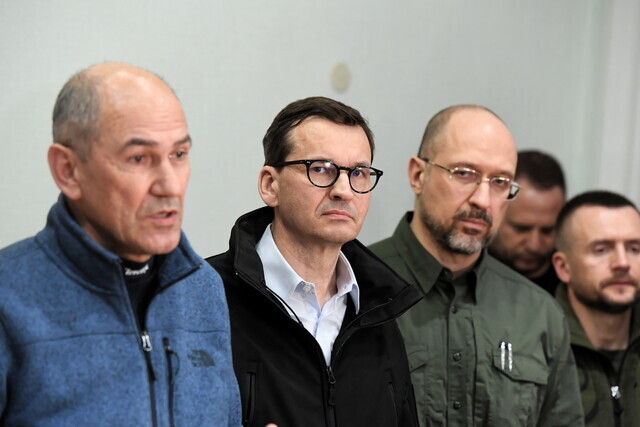hankyoreh
Links to other country sites 다른 나라 사이트 링크
Poland’s history as victim of Russian aggression spurs it to aid Ukraine

The country most terrified by Russia’s invasion of Ukraine is unquestionably Poland. Due to its geopolitical position between Russia and the West, it has already lived through the deeply traumatizing historical nightmare of being twice broken apart.
Poland is also the country that has been the most proactive about supporting Ukraine since Russia launched its invasion on Feb. 24.
On March 8, it proposed supplying Ukraine with 28 of its Soviet-made MiG-29 fighter aircraft, although that plan was eventually abandoned over objections by the US. On March 15, Prime Minister Mateusz Morawiecki joined his counterparts from the Czech Republic and Slovenia in a powerful show of solidarity as they traveled through the bombardment to visit the Ukrainian capital of Kyiv.
The reason Poland has been moving with such urgency has to do with its fears that Russian combat boots could end up stamping beyond Ukraine and into its own borders.
In an interview published in the March 12 edition of the Los Angeles Times, Polish foreign policy expert Slawomir Debski said, “Polish society is terrified.”
“The whole society is aware of how awful, how terrible, and dramatic, any kinetic confrontation with Russia can be,” he explained.
Poland is a member of the North Atlantic Treaty Organization, or NATO — but Dorota Karpinska, a 61-year-old Pole, stressed that NATO “is just a name.”
“Who knows what they’re doing?” she asked, cynically.
The anxieties were heightened further on March 13 when Russian missiles struck Ukraine’s Yavoriv military base, which is located close to Poland’s eastern border.
Poland shares a 500-kilometer border with Ukraine to the southeast and a 230-kilometer border with the Russian exclave of Kaliningrad. The country currently serves as a pathway for US and European weapons traveling to Ukraine, and it also offers an escape route and harbor for millions of refugees fleeing warfare in Ukraine. This makes it exceedingly vulnerable to conflicts between Russia and Ukraine.
Poland’s troubled relationship with Russia has deep historical roots. In the late 18th century, it was divided up by imperial Russia, Prussia, and Austria — the start of a 123-year-long period of rule.
It narrowly achieved independence after World War I, but it ended up divided once again in World War II, where it faced simultaneous attacks from Soviet Russia in the east and Germany in the west. The NKVD, the Soviet Union’s secret police force, subsequently committed the atrocity known as the Katyn massacre, where more than 30,000 Polish prisoners — including soldiers, police, and professors and other intellectuals — were executed and buried.
Poland was liberated at the end of WWII in 1945, but throughout the Cold War era it remained a Soviet satellite state. Soviet influence played a part in suppressing democratization movements there, and a liberal administration only came to office with the collapse of communism.
Ever since, it has adhered to a firmly pro-Western stance: joining the Organisation for Economic Co-operation and Development in 1996, NATO in 1999, and the EU in 2004. It has also pursued the stationing of US troops in its borders, with the first deployment coming in 1997.
After remaining at the level of around 4,000 troops through early 2022, the number of US troops stationed in Poland has risen to roughly 9,000 since the war in Ukraine erupted last month.
By Hwang Joon-bum, staff reporter
Please direct questions or comments to [english@hani.co.kr]

Editorial・opinion
![[Column] When ‘fairness’ means hate and violence [Column] When ‘fairness’ means hate and violence](https://flexible.img.hani.co.kr/flexible/normal/500/300/imgdb/original/2024/0516/7417158465908824.jpg) [Column] When ‘fairness’ means hate and violence
[Column] When ‘fairness’ means hate and violence![[Editorial] Yoon must stop abusing authority to shield himself from investigation [Editorial] Yoon must stop abusing authority to shield himself from investigation](https://flexible.img.hani.co.kr/flexible/normal/500/300/imgdb/original/2024/0516/4417158464854198.jpg) [Editorial] Yoon must stop abusing authority to shield himself from investigation
[Editorial] Yoon must stop abusing authority to shield himself from investigation- [Column] US troop withdrawal from Korea could be the Acheson Line all over
- [Column] How to win back readers who’ve turned to YouTube for news
- [Column] Welcome to the president’s pity party
- [Editorial] Korea must respond firmly to Japan’s attempt to usurp Line
- [Editorial] Transfers of prosecutors investigating Korea’s first lady send chilling message
- [Column] Will Seoul’s ties with Moscow really recover on their own?
- [Column] Samsung’s ‘lost decade’ and Lee Jae-yong’s mismatched chopsticks
- [Correspondent’s column] The real reason the US is worried about Chinese ‘overcapacity’
Most viewed articles
- 1[Column] US troop withdrawal from Korea could be the Acheson Line all over
- 2China calls US tariffs ‘madness,’ warns of full-on trade conflict
- 3[Column] When ‘fairness’ means hate and violence
- 4Could Korea’s Naver lose control of Line to Japan?
- 5[Editorial] Yoon must stop abusing authority to shield himself from investigation
- 6Naver’s union calls for action from government over possible Japanese buyout of Line
- 7Several victims of Jeju Massacre still remain unaccounted for
- 8The quest to rediscover Jeju’s lost towns and villages
- 9Self-driving buses, taxis to hit roads in Seoul in October
- 10A Korean production studio may have made your favorite show – even if you don’t watch K-dramas